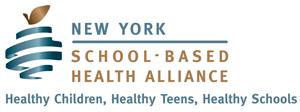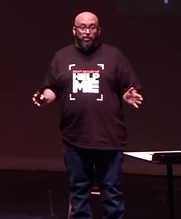Equity Warrior – Overcoming Systemic Inequity for Our Children
presenter: Luis E. Torres, MA, SDA, SAS
From being held back in the second grade while living in one of the nation’s most challenging communities to becoming a nationally recognized, innovative and celebrated school administrator, Luis Torres strives to create opportunities for school-aged children to level America’s socio-economic playing field.
Mr. Torres is the principal of NYC PS 55 in the Bronx, a community school well-known for its deep commitment to arts programming, student engagement and learning, and tireless service to its surrounding community. Mr. Torres will share his story and infectious passion for his students in this keynote presentation sure to inspire and invigorate attendees.
CONCURRENT SESSIONS A
Reaching the Unreachable: Telehealth Can Help
presenters: Chris Kjolhede, MD, MPH; Lisa Kwiatkowski and Kari Austin
Utilizing a $297,000 telehealth grant from the U.S. Department of Health and Human Services, Bassett Healthcare’s School Health Program is now able to offer telehealth services in its school-based health care setting.”The geographic spread across the rural region Bassett serves makes it virtually impossible to effectively and efficiently meet specific health needs of the pediatric population…adding telehealth services in many of our school-based health centers is a way for Bassett to continue to build on the school-based health program, further improve accessibility of health care services and improve the health care outcomes in medically underserved areas,” explains Dr. Kjolhede, SBH co-director. This interactive and instructive three-part session delves into examples of how telehealth can be used in the care of hard-to-reach student populations.
Chronic Absenteeism and Health: Why Attendance is a Team Sport
presenter: Ginelle Wynter
Chronic absenteeism is often a red flag for unmet student needs, often including poorly managed health conditions. Increasingly, schools are focusing on creative ways to reduce chronic absenteeism. This Healthy and Ready to Learn workshop presents an approach to promote collaboration between SBHCs and schools, through partnership around attendance messaging and health promotion to reduce chronic absenteeism. By analyzing example scenarios, participants will learn to identify areas for collaboration with school partners.
Mindfulness and Self-care for School Based Health Center Staff and Adolescent Patients
presenter: Melanie A. Gold, DO, DMQ, FAAP
This innovative session is a mixed didactic and experiential workshop with the following objectives: a) Identify sources and symptoms of stress leading to dissatisfaction and burnout for school based health center staff and to anxiety and poor health among adolescents b) Describe the benefits of mindfulness and other integrative approaches to self-care, and c) Experience a variety of modalities that can enhance well-being including mindfulness, aromatherapy, and acupressure, and learn how to introduce these to adolescents. Presented this year at the American Academy of Pediatrics Caring for the Whole Child Conference in Tucson, AZ this session focuses on integrative health, burnout prevention, and pain and anxiety management. Limited to 40 participants.
CONCURRENT SESSIONS B
Pre-Participation Physical: Nuts and Bolts
presenter: Kamila Barnes, DNP, FNP-C
According to the AAFP, approximately 30+ million adolescents annually receive medical clearance to play sports. The goal of the pre-participation exam (PPE) is to reduce the risk or morbidity and mortality associated with endurance activities and improve athlete safety. Providers will learn about focus areas in history taking and physical exam. There will be a review of disqualifications (contact and non-contact endurance), appropriate referrals, and follow up. We will discuss how to determine clearance for patients who have a significant cardiac or respiratory condition, concussion history, sport injuries, as well any specific family history conditions that require follow up.
School-Based Medical Home Transformation in a Pre-K through 12 School in the Bronx
presenters: Louann Casiano MPH and Nina Castelnuovo MD, FAAP
In mid-2018 Montefiore’s School Based Health Program began the process of transforming to a School-Based Medical Home (SBMH) under new National Committee for Quality Assurance (NCQA) standards. A formal application was started in January 2019 with the goal of having 6 school clinics, a mixture of elementary, middle and high schools, gaining SBMH recognition by the end of this year. This presentation describes the transformation process from start to near finish from the perspective of the lead clinical site, a prekindergarten through 12th grade campus in the Mount Eden section of the Bronx. Clinical and administrative successes and challenges will be presented by the site’s medical provider and site administrator.
Statewide Health Information Network of New York (SHIN-NY) Overview
presenter: Elizabeth Amato, Vice President, SHIN-NY Programs, New York eHealth Collaborative (NYeC)
The Statewide Health Information Network for New York (SHIN-NY) is comprised of regional health information networks (RHIOs, also known as Qualified Entities (QEs)). The SHIN-NY allows for the electronic exchange of clinical information and connects healthcare professionals statewide. Overseen by the NYS Department of Health (DOH), the SHIN-NY enables collaboration and coordination of care to improve patient outcomes, reduce unnecessary and avoidable tests and procedures, and lower costs. The SHIN-NY allows participating healthcare professionals, with patient consent, to quickly access electronic health information and securely exchange data statewide. The New York eHealth Collaborative (NYeC) has been designated by DOH to coordinate, facilitate and lead the activities of the SHIN-NY enterprise. In this session, presenters from NYeC, along with the HEALTHeLINK and HealtheConnections QEs, will provide our SBHC audience with an overview of the SHIN-NY and demonstrate its value through core services, use cases for school-based health centers, etc.
POST LUNCH “SPEED DATING” AGGREGATE SESSION
- Learning, Mindfully: How a School-Based Health Clinic Brought Mindfulness to Schools Aubree M. Guiffre, Ph.D., Rochester Regional Health
Teacher and student distress is a real concern that has practical implications in the classroom. Mindfulness is a practice that teaches people to focus on one thing at a time, in the present moment, in a non-judgmental way. The Mindful Schools curriculum focuses on increasing and improving student and teacher attention using focused attention to reduce stress, and building empathy.The Rochester Regional Health System SBHC is partnered with five schools in the Rochester City School District (RCSD) and over 3,700 enrolled students to implement the Mindful Schools curriculum. This session will provide an overview of the curriculum, the specific roles SBHCs have in the collaborative process supporting this program, including partnerships with three school administrators and how a DYSRIP grant was utilized in this program. Sample lessons and testimonials will be included.
- Asthma Two-Ways: Improving Care through the NYSDOH Quality Initiative in East Harlem Clare Cabellos, NP & Forming Community Partnerships to Enhance Clinical Outcomes in Buffalo Kim Utech, NP
– Mount Sinai Hospital has School Based Health Centers in five sites in the East Harlem Community, including the Roberto Clemente Campus, serving PS38 and Harlem Prep Charter MS. The East Harlem community has significant health burdens when compared to the rest of Manhattan. The rate of hospitalization for asthma in children age 5-14 years in East Harlem is more than double that in Manhattan.and asthma ER visits more than double Manhattan’s rate. Elementary school absenteeism, impacted significantly by asthma, is 30% in East Harlem, compared to 18% in Manhattan. At the Roberto Clemente Campus, serving PS38 and Harlem Prep Charter MS, the rate of asthma among the students enrolled at the SBHC is 17%. For the 2018/19 school year, the SBHC at Roberto Clemente Campus participated in the New York State Department of Health Asthma Quality Improvement Collaborative. Areas of significant improvement, including development of EPIC EMR visit and Asthma Action Plan templates will be discussed along with goals for sustained improvement.
– Social and environmental factors have contributed to the significant pediatric asthma problem in Buffalo. In an effort to improve the quality of life for asthmatic children, P.S. 76, a Buffalo School-Based Health Center, formed community partnerships with Oishei Healthy Kids and the WNY Children’s Environmental Health Center. This partnership helps support asthmatic students by connecting them with organizations that can provide preventive care for the entire family. Asthmatic preventive care services that are offered to qualified students include home-visiting services, environmental asthma trigger assessment, and education. Join this session to learn more about the role of community partnerships in supporting school-based health centers.
- Innovative Strategies to Improve HPV Vaccination in Primary Care and SBHCs in NY Michael Seserman, MPH American Cancer Society
The NYS HPV Coalition recently received a grant to increase HPV vaccination rates through statewide education and innovative quality improvement (QI) initiatives for providers, health plans, and school based health centers (SBHCs). Coalition leaders will provide an HPV update and describe one of the two funded collaborative projects: Introduction of the new HPV Vaccination Guide for SBHCs and Continuous Medical Education module, with a discussion about vaccinating at SBHCs, solutions to common barriers such as obtaining consent to vaccination, and evidence-based strategies to increasing vaccination rates in this setting. By the end of this session, attendees will have learned evidence-based strategies for improving HPV vaccine uptake and have tools, resources, and contact information for participation in these novel, statewide HPV QI programs.
- Survey Readiness Jane V. Hamilton, RN
School-Based Health Centers are subject to multiple regulatory reviews. Mini-session will discuss how a 20 SBHC system prepared and tries to maintain constant survey readiness. During this past year the program was surveyed by both IRPO and JCAHO. More importantly than begin ready for surveyors, we maintain constant “Patient Readiness”. How this SBHC system attempts to sustain behaviors and processes, discussion of preparation communications,and nuts & bolts will be addressed.Presenter will share both successes and ‘less than’ successes with audience.
- SBHC Data Visualization
A hands-on mini-workshop to illustrate effective data visualization techniques for SBHCs and get feedback on what data pictures will best support your work including clinical care, population health promotion, and advocacy.


